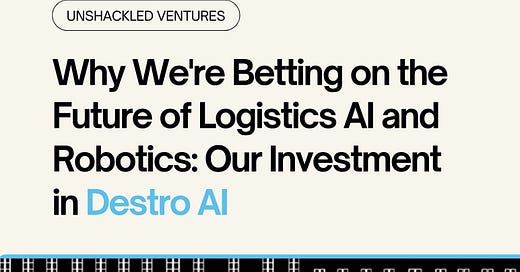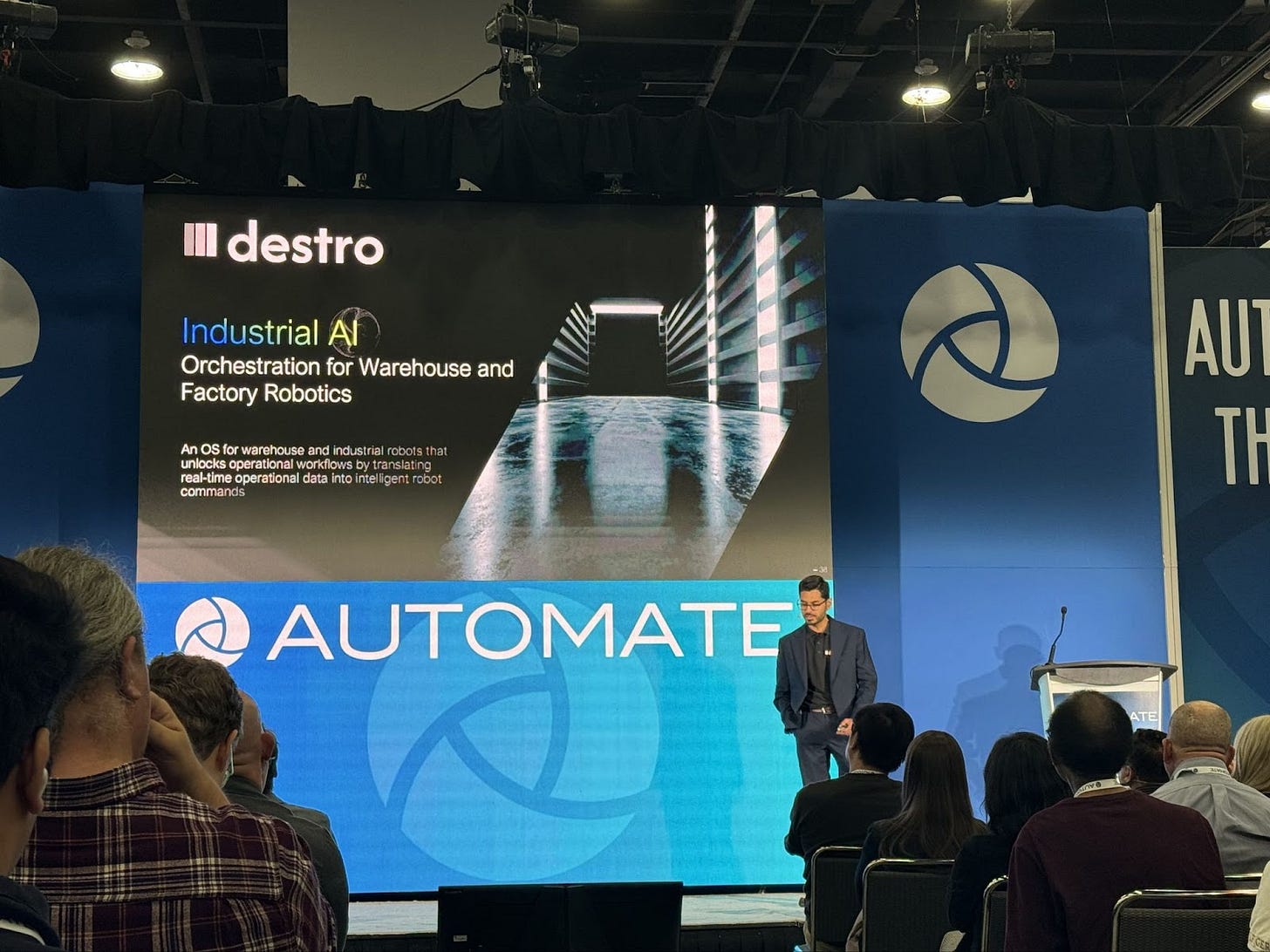Why We're Betting on the Future of Logistics AI and Robotics: Our Investment in Destro AI
Despite billions in robotics investment, 95% of warehouse operations are still manual. We just backed the team that's going to change that.
Walk through any major distribution center today, and it's like two different worlds in there. In some areas, you'll find sophisticated automated storage and retrieval systems, maybe some autonomous mobile robots handling specific tasks. But step into other areas, where the real work happens, and you'll see armies of workers doing exactly what they've been doing for decades: walking, searching, lifting, and moving items manually.
Even with the headlines about logistics automation and the billions being invested in robotics, 95% of warehouse operations are still completely manual. Workers are still walking miles through factories every day, pushing carts, searching for items, and doing the heavy lifting that robots were supposed to eliminate years ago.
But the real blocker here isn’t hardware, it’s intelligence.
There are thousands of companies in industrial robotics, AMRs (“Autonomous Mobile Robots”), autonomous forklifts, and now, hundreds racing into humanoid robotics. Many are engineering impressive hardware, optimizing for cost, and pushing the limits of local autonomy with embodied AI. Today’s robots can map environments, avoid collisions, follow dynamic paths, and even grasp unfamiliar objects. But zoom out and the bigger picture is still broken.
Nearly all of the AI in robotics today (95%) focuses on local decisions: labeling objects, detecting obstacles, segmenting scenes. The remaining 5% is on local control systems that let a robot make real-time decisions based on immediate sensory inputs.
But none of this answers a fundamental question: Which robot, at what location, should perform which task, at what time?
That’s the missing layer ➡️ global intelligence.
Local autonomy is about reflexes. Global intelligence is about judgment. It’s what allows a robot fleet to act like a cohesive workforce not a bunch of disconnected machines. It’s what turns chaotic factories into a self-optimizing system.
To be honest, we don’t lack capable robots. We lack a brain that can assign, sequence, and orchestrate robotic labor in real-time, accounting for resource availability, business constraints, throughput priorities, and dynamic changes in demand.
This is a massive automation gap that represents one of the largest unsolved challenges in the logistics industry. And that's exactly why I'm excited to announce Unshackled Ventures' investment in Destro AI - building the intelligent orchestration platform that will finally bridge this gap.
Destro AI: The AI Brain for Warehouse & Factory Operations
From my first meeting with Manthan, what stood out wasn’t just the technical approach, it was how clearly he articulated the intelligence layer missing from most automation efforts.
“If individual robots are like apps, Destro is building the OS.”
That framing stuck. Because today’s warehouses aren’t short on robots, they’re short on coordination.
Destro is building the intelligence layer that makes diverse robotic systems work together as one. Destro is robot-agnostic, meaning their platform can coordinate AMRs from one company, robotic arms from another, and autonomous forklifts from a third, all while optimizing the entire workflow for maximum efficiency. The platform converts business-level data into intelligent robot commands that optimize not just individual robot performance, but entire warehouse workflows that have remained stubbornly manual.
Led by Technical Visionaries
From the moment Manthan and Soorya came to the U.S., they've been on a deliberate path of embedding themselves deeper into the robotics ecosystem. But what struck me wasn't just their credentials, it was how their specific lived experiences led them to see the problem everyone else was missing.
Manthan didn't just work in robotics; he lived at every layer of the industry. He started in system integration, working with some of the largest players in robotics and logistics. He didn't just learn the tools, he embedded himself with OEMs, factory operators, software teams, and hardware teams. Everywhere he went, he moved the needle, whether that meant standing up new robotics programs or bridging the gap between technical teams and enterprise buyers.
That journey gave him something rare in this industry: a cross-functional view of the entire stack, from planning to deployment to post-sales service. And it's exactly that perspective that led him to his key insight, the biggest problem in industrial robotics wasn't hardware. It was intelligence. And no one was solving for it.
Soorya's path is equally grounded, but from a different angle. With his background in swarm robotics and multi-agent systems, he brings the kind of systems thinking that most warehouse automation efforts have completely lacked. But what stands out even more is his ability to turn that complexity into working software, fast. In four months, they built a functional platform that can coordinate multiple robot types. That's not just technical skill; that's the kind of execution speed that startups need to survive.
Together, they embody the archetype I look for in founding teams today: Technical Visionaries. They bring deep technical chops, genuine customer empathy, and a willingness to go heads-down on hard, unglamorous problems that others have given up on.
Manthan understands why enterprise customers have been frustrated with existing solutions. Soorya knows how to build the software that actually solves those problems. Grateful to this team for their trust and the opportunity to back their potential!
Immigrants Start Here.
About Unshackled Ventures:Unshackled Ventures is the only early-stage venture capital fund that enables unrecognized and excluded immigrant founders to start companies in the U.S. Since its founding in 2014, Unshackled has proven its thesis that investing and supporting this population drives strong investment returns across key industries, including American infrastructure, generative AI, healthcare, space, and enterprise SaaS. To date, the firm has invested in over 100 companies and over 250 entrepreneurs.









